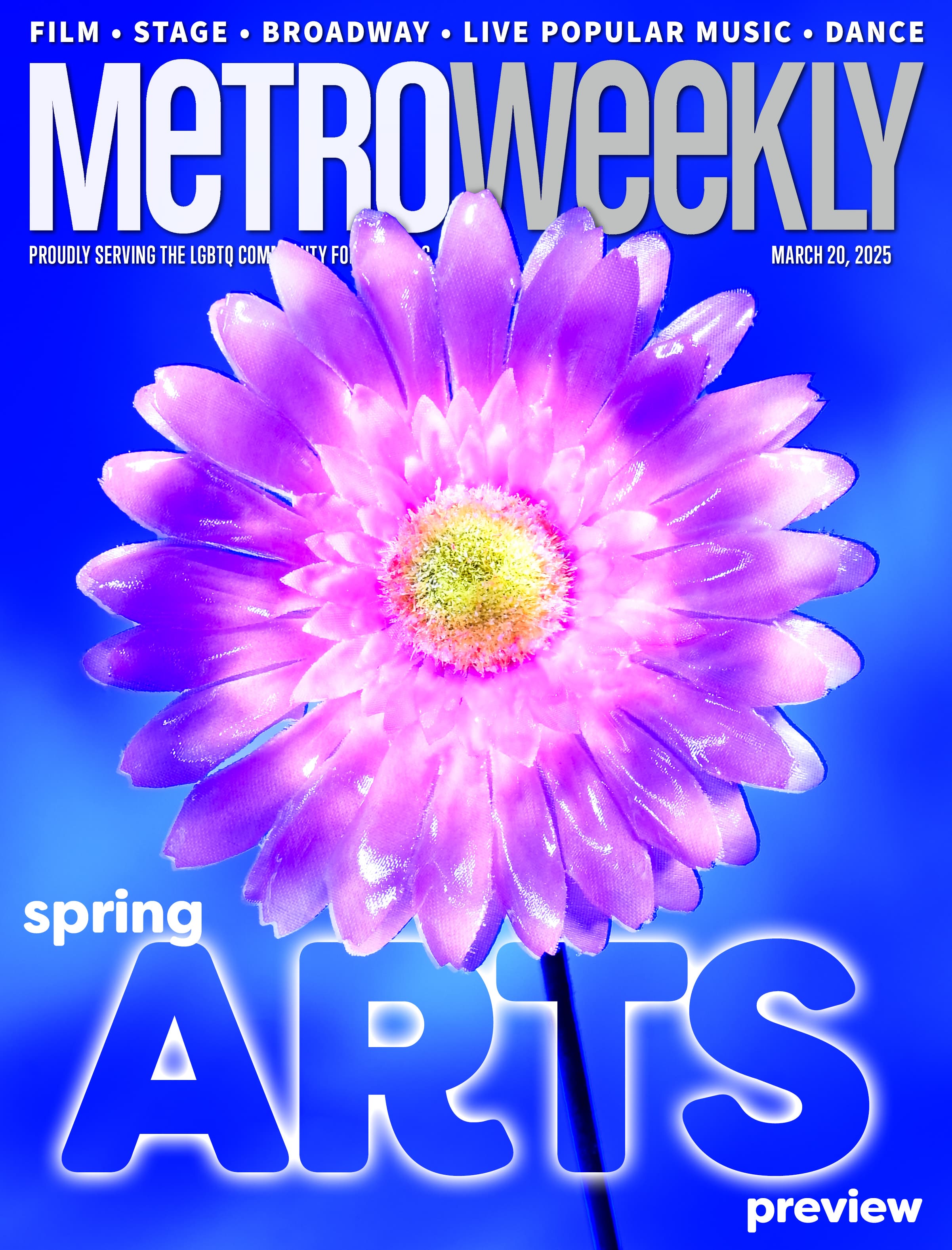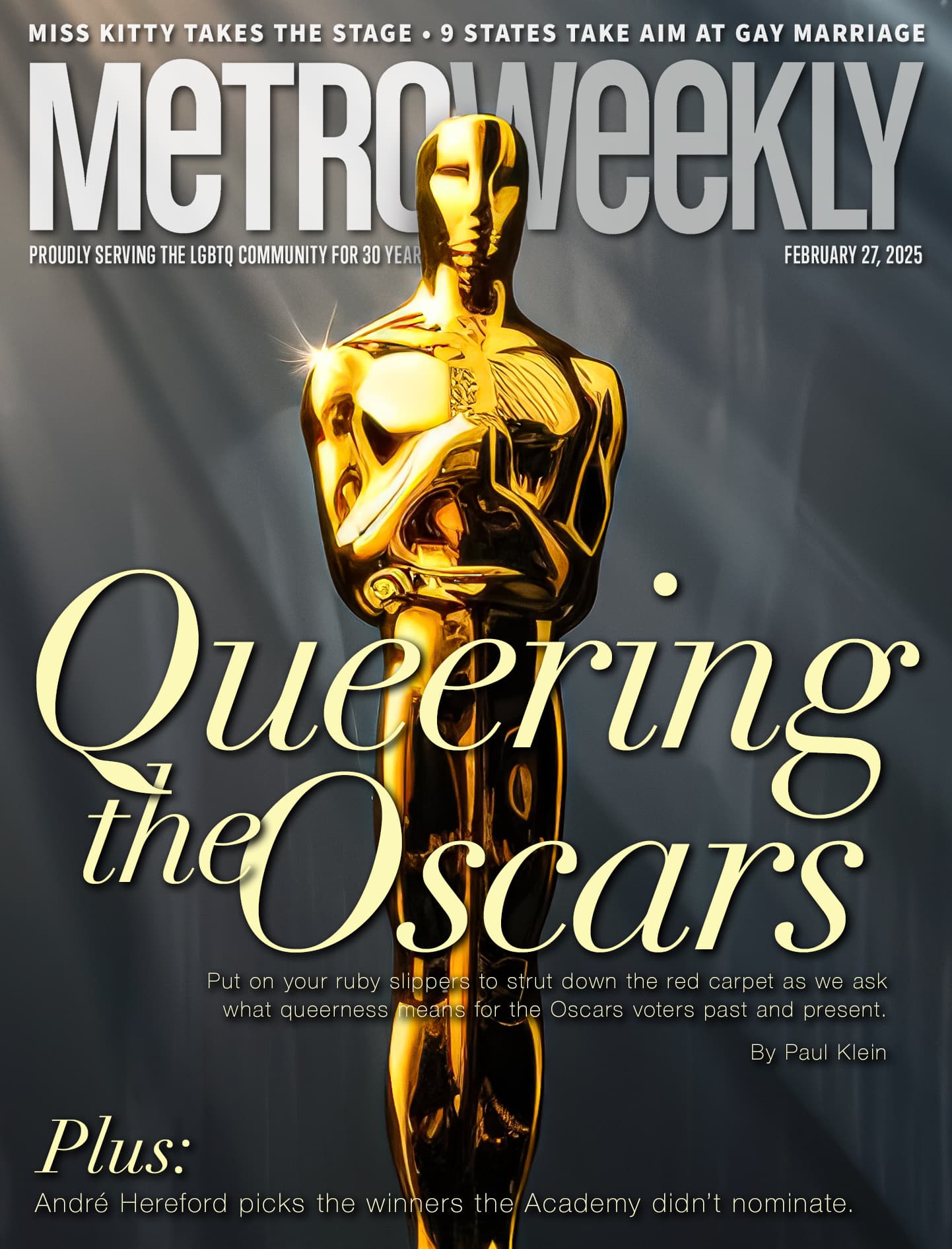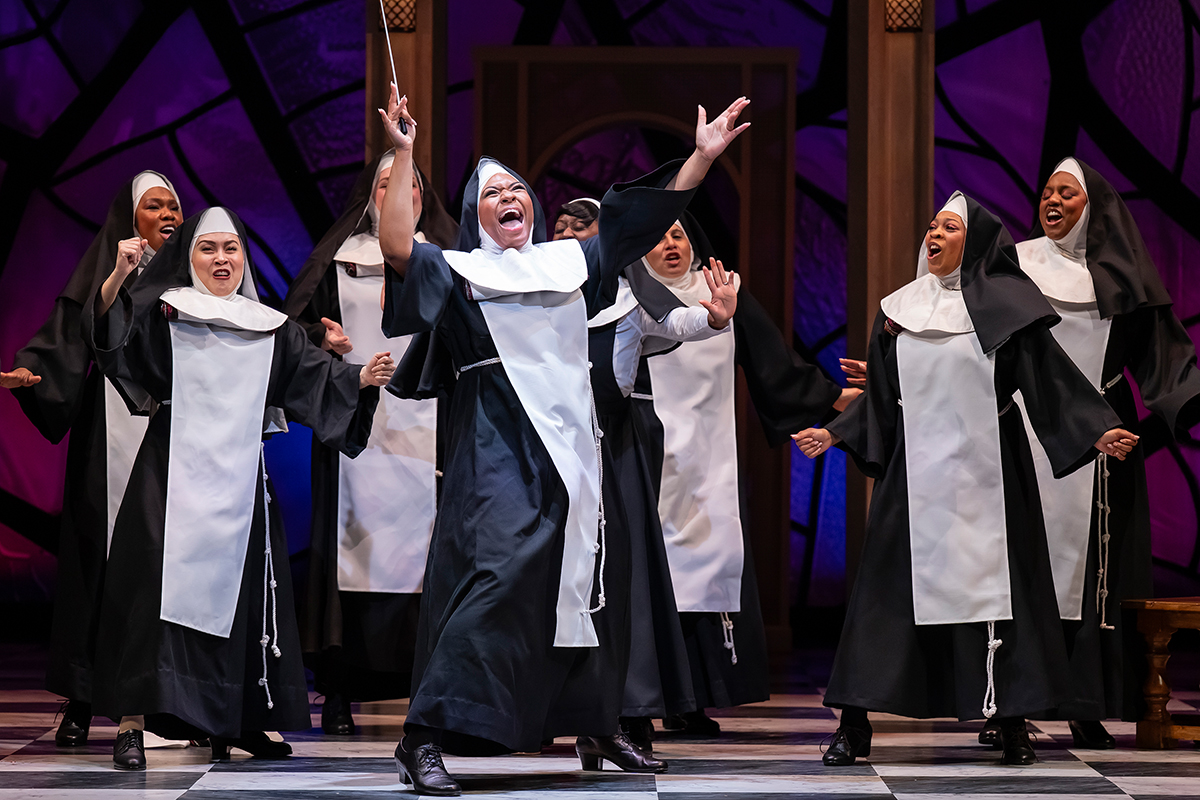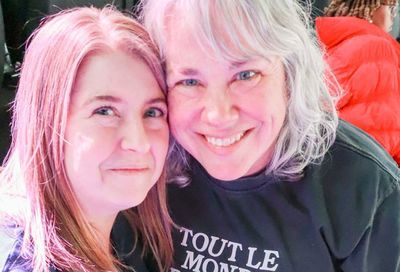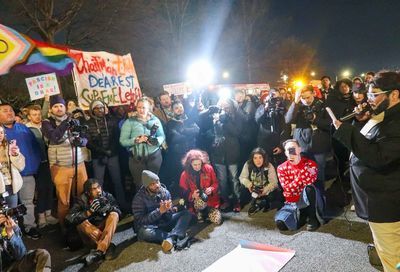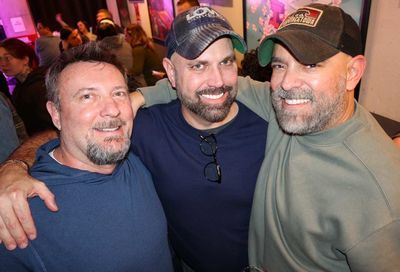Fringe Benefits
Jonathan Padget takes the stage from a new direction with a musical version of 'The Blue Lagoon'
 Jonathan Padget (right) |
Jonathan Padget knows his way around the Washington theater scene. Having spent a number of years as a former Metro Weekly staff writer and theater critic, and then an arts columnist for the Washington Post Style section, he’s seen more than his share of productions — good and bad.
And he’s never been shy of saying just what he thinks.
Now Padget is coming at theater from a different perspective: as the director, writer and composer of a musical version of The Blue Lagoon.
Why The Blue Lagoon, you may ask?
Part of the answer is the Capital Fringe Festival, the second annual series of locally produced plays that run the gamut from the mainstream to the wacky. Perhaps with a tendency toward the wacky. And that’s a good thing, as local directors, playwrights and actors find a home for new, daring and interesting works. (For a listing of Fringe Festival offerings of particularly gay and lesbian interest, see page 29.)
Anyone who knows Padget knows his love of both words and music. The love of the former has led him along a journalistic career path, including his stint at Metro Weekly, as well as his current position as a Style copy-editor, where he can ”obsess over sentence structure and punctuation.”
But even from childhood, his passion for musical theater was a prominent part of this life from the moment of his first onstage role as an orphaned waif in a community theater production of Oliver! Bringing The Blue Lagoon to stage — with two actors, a kiddie pool and a keyboard — is only the latest result of that ”can-do!” beginning.
METRO WEEKLY: Let’s just cut to the chase: Why The Blue Lagoon?
JONATHAN PADGET: Why not The Blue Lagoon? I’ll start with the practical reasons: I could cut it down to two people — there are some other characters in the story but they’re not really necessary. It’s just the simplicity of two people with hormones on a desert island. It just screamed musical theater. It screamed a lot of things, in fact.
I didn’t want to rip on the movie. The movie is very iconic, but not necessarily in a good way. But so many people know the movie, whether or not they’ve seen it. If you know the title, you can visualize Christopher Atkins and Brooke Shields: They’re shipwrecked on an island and they hook up and that’s about it. It’s all this kind of vague memory and that works really well with the way I’m producing it — on the cheap with the kiddie pool and the bathing suits and the big globe light from Target and my synthesizer. It has kind of like a surreal dream sort of feel, like one of those drunk dreams. I just thought it’s so unrealistic but so interesting. And it’s really very gay. Maybe it’s the way the movie was done, like such a soft-porn thing.

MW: Like a ’70s Falcon movie, but with a girl in it?
PADGET: Kinda like that. The movie has an interesting story. Randal Kleiser, the director, was the guy who directed Grease, which was so huge that he could do whatever he wanted. And he wanted to do The Blue Lagoon with Christopher Atkins.
It has such a gay sensibility because it’s so light. It’s so titillating with Atkins in a way that was unusual for 1980, and he’s not hypermasculine. If he were on the island with a boy cousin, they’d probably be gettin’ it on, too. It was kind of situational, like if I’m on an island, and there’s only one other person and she’s a girl, well, I gotta do something.
MW: How would you describe your approach with musical theater? Is it playing it straight, so to speak, or is it campy?
PADGET: It’s definitely broad. I don’t know if it’s campy in the truest form, but it’s closer to camp than it is to straight. There’s something at the core of a musical theater moment: At the moment you have to break out in song, if the song the hook and the lyrics are good, it’s just the pure emotion you’re expressing. It’s just a little euphoria that comes in these musical theater moments. I thought that would lend itself so well to a situation that’s just so wrong in many ways. They’re first cousins, you know, on an island. It’s a screwy situation but we approach it in such a romantic way. It’s like, ”Oh, that’s the way I felt when I was 15 or 16 and I had a crush.” There’s a tension, because you really get caught up in it but you’re like, ”How caught up do I get before I’m complicit in the wrongness of it all?” That drives a lot of the humor of it.
MW: What about your musical approach? When people hear it are they going hear references or styles — like Oklahoma! or something?
PADGET: That would be fun if it were like Cats. It’s really more like Evita. [Laughs.] The show is very pop Broadway balladry, which in the early ’80s pop and Broadway were closer together but now not so much. Now the theatrical ballads [are] these big soaring ballads that sound like they’re from American Idol. I’m not so interested in that sort of thing. I’m more interested in things like ”You Light Up My Life.”
This is the first time I’ve composed in my adult life. I played with it a little bit when I was young but I went in a different direction in college, and ultimately I ended up on a journalistic path. But I’ve always had this creative stuff going on in the background so this is the first time I’ve tried to push it to the forefront and say, ”What can I do?” I think [the show] is coming off as very funny because maybe I can’t be too serious — I’m still figuring out if I should be doing this or should I have done this or should I do this again.
MW: I want to step back a little bit here. One of the advantages of this interview for me is that I actually know something about you as opposed to a lot of people I interview.
PADGET: You probably could have asked me to write it. I’m glad you didn’t do that. [Laughs.]
MW: I know that when you were a young kid at the World’s Fair in Knoxville, Tenn., musical theater saved you from the oppressive summer heat. Obviously, musicals have been important to you since you were a kid in South Carolina.
PADGET: I grew up in a small town that was heinous in so many ways, but not nearly as heinous as a lot of towns are — it had a community theater, although it wasn’t very good. I was 8 when I tried out for my first show, which was Oliver!, as a workhouse orphan boy.
My parents took me to theater pretty young, around 6 or 7, but they’re not super-cultured people. They wanted me to go to school and college, so they wanted to expose me to things, but if it was too much trouble, they weren’t going to do it. I was such a stereotypical gay child that I couldn’t deal with athletics. They wanted nothing more than for me to be out there in the football pads and I was like, ”Oh, I’ll break a nail.” And so theater was so appealing.
My parents are older than some of my peers’ parents. We had soundtracks and cast albums in the house from the ’50s and ’60s. It was the kind of thing they liked and they approved of. If I had wanted to be a punk rocker or whatever, that would have freaked them out. But theater, that’s okay — as long as I didn’t do it professionally. But that first role in Oliver!, the experience was just [amazing]. That’s what got me through, that’s how I was able to cope with growing up, with being a fat kid and being a sissy kid. None of that mattered in the theater. I could go there and be other characters and do great music. I did shows one after the other. None of them were good productions, but I went through the Rodgers and Hammerstein canon and a lot of the biggies.
In college, the experience was much better because we had a good theater department. I also had other interests then — I was picking up writing and I kind of wanted to do arts administration. Then I got into a kind of social service, ”save the world” mode for a few years. After figuring all that out, I came back to theater as a performer about 10 years ago. I moved to Washington in 1996, and in ’98 I wanted to do one more show. I had never done a Sondheim show, so I wanted to do Merrily We Roll Along, which was being produced by the Reston Community Players. I tried out for it, got the role, and it was a good experience.
Then another company, the Elden Street Players in Herndon, had an actor drop out of this really strange play called Steam Bath. It was all about people in a steam bath and these two gay guys and the washer-woman who was God and a whole purgatory sort of thing. One of the super stereotypical gay characters dropped out like a week before they opened. So, they were sitting there in Northern Virginia saying, ”Who do we know that could do a stereotypical gay? That guy who was just in that show in Reston!” So they called me up and said, ”Can you come in and learn this part in a week and run it for a month?” So I did that and I thought, ”Okay, I don’t need to do that again.”
MW: On the one hand, you say that as you grew up you were a ”stereotypical gay kid.” Yet I know you had to come out to your parents. Was your being gay something they already kind of knew?
PADGET: No, they were in denial. To them I was ostracized because I was a fat kid. I was husky. And that served their purposes — as long as he’s a husky child he won’t get into dating. They just didn’t connect that I was creative and musical and did well academically, and that all those things just made me different. I was just an asexual person to them. I dealt with that and as soon as I was away from home, I was like ”Okay, let’s figure this out.” And what was funny, I dated a girl for a few months my freshman year in college. Don’t laugh!
MW: We all tried it once.
PADGET: I dated a fag hag. It freaked my parents out. They actually responded to the fact that I was intimate with this girl, but by that time I had figured [my sexuality] all out. We had split up and she was taking me to gay bars. And my parents didn’t know or wouldn’t face up to knowing that I was gay — that just wasn’t conceivable to them. So it was a bad scene and they’ve never dealt with it. We just haven’t had a healthy relationship.
MW: I’m sorry to hear that.
PADGET: My partner’s parents are really nice. I have good in-laws. And my sister is good. I have family connections, but not so strong with my parents.
MW: Do you communicate with them?
PADGET: Very rarely. They’re much older, they’re pretty isolated, they’re kind of dysfunctional and do their own thing. Our paths just don’t cross.
MW: Is it something that bothers you a lot?
PADGET: It used to be a real sore point. Everybody else had such normal parents and mine are freaky. But you know, it’s better to know they’re freaky and deal with that than to pretend that they’re not freaky and keep getting hurt. If they were much different people and I didn’t have a relationship with them, that would really suck. But it’s okay that I’m not so close to them. They’re just not particularly nice people.
MW: Does that make your in-laws a little more special?
PADGET: It totally does. It just makes me grateful for my partner [Scott Wells]. Coming out is never easy. It gets easier for each generation, but for us Gen-Xers, coming out in the ’80s was not the best scene. It wasn’t completely smooth for him but it was so much better than a lot of people. Mine was pretty bad, but I got through it. I’m so glad that his was much better and that it has also led to them having a very solid relationship now. They’re really lovely people. You surround yourselves with the loveliest people — you search those people out and those are the people you treasure. Sometimes the loveliest people aren’t the people you’re related to. Sometimes you don’t have a choice and you have to deal with what you’re dealt.
MW: With most people who have bad coming-out experiences with their parents, I tend to expect them to really distance themselves from religion, but you don’t seem to have done that.
PADGET: [Religion] was bad coming from my parents, but it wasn’t consistent. They were in different denominations and different congregations. They would attend really intensely for some years, and then they wouldn’t go. It was just kind of a mess, but their religious convictions were what drove their disapproval, their condemnation, of my sexuality — not even homosexuality, just sexuality. Like, ”Sex is bad.” How my sister and I got conceived and born, they don’t talk about that.
The church stuff was okay, but it was how that translated in the home that was so weird and repressive, the kind of thing that people run away from. But there were a lot of things that made sense to me [with church] and there were a lot of things I connected with. I chose to find the best theology that worked for me and embrace it and make it be a positive thing. As an adult, I chose to be an Episcopalian. That served me really well for a long time. I had a good local Episcopal church. I came to Washington through an Episcopal-related volunteer program.
It was a real good underpinning and it’s really gone to shit in the past year or so with the new bishop and the last convention. I have sympathy for the church as an institution up to a point and certain things that they’ve been going through with people around the world freaking out over the gay bishop in New Hampshire. The church was really doing well with gay people, but then when people get too upset about it [it changed]: ”We’re really into gay people, but gay people, would you mind just chilling out for a little bit? What we’re going to say is going to sound like we’re going backward but really we’re saying something different than what we’re going to do, but we’re not going to do anything more. You just be quiet for a while and in a few years it’ll all work out.”
That really angered me. I’ve come to a point in my life where you say what you mean and you mean what you say and you don’t do a lot of BS. If you’re too much in the BS mode, I can’t relate to that. So I’m away from the Episcopal church for the moment. I would like to be back there, but I’m not going to do it under these circumstances. Things have to change for me. That’s about me, that’s my stand.
MW: When you were with Metro Weekly, you were a pretty tough theater critic, to put it mildly. When you liked something, you really liked it, and when you hated something, you really hated it. Has your time as a critic made you nervous about putting your work out in front of people?
PADGET: Sure, it always does. I know people are going to have the same reactions [as I did as a critic]. I want people to have a strong reaction. I don’t want to be bashful about putting myself out there. Whatever I’m going to do I’m going to put it out there and you can come see it and let me know what you think. If anyone feels obligated to tell me they don’t like it in retribution for feedback that I’ve given in the past as a critic, whatever.
Some people won’t like my stuff. Maybe a lot of people won’t like it or maybe a lot of people will love it. That’s why you have to have critics and you have to have an audience. It’s all about what the audience thinks. The critic has a different role than an audience member. You have 200 people in a theater and you have 200 opinions, but it’s one opinion that gets published in Metro Weekly or elsewhere. When you’re reading criticism, it’s what this critic thought about the show, and telling you why [the critic] thought that. You can agree or disagree.
I’m aware that people in the theatrical community think that critics have an obligation to temper what they say or filter what they say or that they have to be very specific: ”I didn’t like it but everyone around me really loved it.” But I also know that people leap up at the end of everything because that’s what people in Washington do, unless they really don’t know what the hell just happened. They’re going to give everything a standing ovation, so how can you say, ”The audience really loved it because they gave it a standing-O”? That’s what audiences have become accustomed to do.
I just love theater and I love being in the theater but I don’t like being in a theater for something I don’t like. If I was going to be there as an audience member and had bought a ticket and sat in that seat for something I didn’t like, that’s two hours of my life I can’t have back. Why did somebody ask that of me? But there are always going to be things that I felt were a waste and some people don’t.
MW: Why did you decide to be a part of the Fringe Festival?
PADGET: Ultimately, because it’s a safe environment to take a risk. Anybody that talks about Fringe says, ”I can do whatever I want.” If people are really geared up for 10 days to go see a bunch of wacky stuff, there’s probably a better chance that they’ll come see my wacky thing during the Fringe Festival than if I were trying to promote my wacky thing on its own.
This is a way for me to put my product out there with support from the Festival and see what kind of response I get, to see if people find it interesting. Staging a musical isn’t earth-shattering — people have to see what I do with it. But the basic idea is that you can push it together pretty easily. You hear, particularly in Fringe Festivals in other places, that there tends to be kind of a derision toward musicals, or it becomes about trying to find the wackiest thing to make into a musical: Morticians, the Musical! I’m not approaching it like that, trying to be the next wacky musical. I really saw in The Blue Lagoon an interesting theatrical situation that I thought I could work with at this level. I couldn’t afford to pay more than two actors or to do more than a kiddie pool as a set. This is what I can do at this point. And if I can do something interesting with this, maybe it can live in a different context later on. Or maybe I can do a different project. Or maybe it’s back to the copy desk and don’t come back into musical theater again.
MW: Is this the direction you would like to go career-wise?
PADGET: If I could have a place in theater as having contributed in some positive way, that would be a very good thing. I have not approached it in terms of being a practitioner. I was not a theater major in college. I might have been, but my parents would not allow it. I didn’t go to graduate school, I haven’t tried to immerse myself in the musical theater industry. I think this is a better way to figure it out than like go spend money for a conservatory or training or workshops. This is a really good way to figure it out. If it’s well received maybe I’ll do more traditional musical theater projects. Maybe I do a Fringe show every few years.
MW: Do you miss working for me?
PADGET: For you, personally, yes. Now, Randy Shulman — you couldn’t pay me to do that again. [Laughs.] Whether or not it’s a serious question, my time here was a very wonderful time and I would not trade it for anything. Every day that I can’t make a joke about the latest porn sampler that comes in the door, I think, ”Wow, those were good times, weren’t they?” Because you can’t do that at the Post. You’ll get written up for harassment. Or improper workplace language. But there were a few things that were improper here at Metro Weekly. Not that there’s anything wrong with that. That’s how it should be.
MW: People don’t generally know you’re our original Coverboy Inquisitor.
PADGET: I never ‘fessed up to that. You gave me one opportunity to go public with a byline as the interviewer and I said, ”No thanks, I’ll be anonymous.” [Laughs.] One of my favorite things about you and Randy was at one point toward the end, you were like, ”We’ve been asking the same Coverboy questions since we started it. Can you give us some new questions before you go?” So I did. And four years later, ”What’s on your nightstand?” That’s my question. ”What kind of plant would you like to be?” Well, that’s my question. [Laughs.] I don’t think those original questions were as stale as you thought they were.
The Blue Lagoon: A Musical runs July 21, 22, 28 and 29 at 8 p.m. at Playbill Café, 1409 14th St. NW. Running time: 60 minutes. Tickets are $15 and available at the door one hour before showtime. To purchase in advance, call 866-811-4111 or visit www.capfringe.org.
Support Metro Weekly’s Journalism
These are challenging times for news organizations. And yet it’s crucial we stay active and provide vital resources and information to both our local readers and the world. So won’t you please take a moment and consider supporting Metro Weekly with a membership? For as little as $5 a month, you can help ensure Metro Weekly magazine and MetroWeekly.com remain free, viable resources as we provide the best, most diverse, culturally-resonant LGBTQ coverage in both the D.C. region and around the world. Memberships come with exclusive perks and discounts, your own personal digital delivery of each week’s magazine (and an archive), access to our Member's Lounge when it launches this fall, and exclusive members-only items like Metro Weekly Membership Mugs and Tote Bags! Check out all our membership levels here and please join us today!




